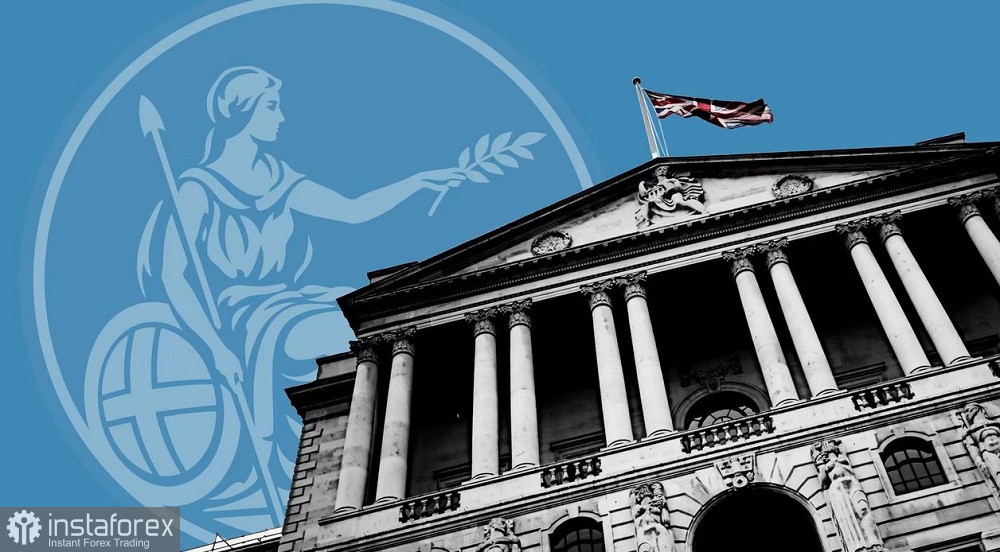The resistance level of 1.2350, which corresponds to the top line of the Bollinger Bands indicator on the D1 timeframe, was nearly reached by the pound/dollar pair yesterday. After updating the price maximum of over two months, the pair made a 180-degree turn and started steadily declining. As a result, GBP/USD traders reacted to the Bank of England's inconsistent March meeting results.
Key statistics on the rise in inflation in the nation were released on the eve of the March meeting in the UK. All of the release's components exceeded expectations, placing the report in the "green zone." In February, the overall consumer price index unexpectedly increased to 10.4% y/y after declining over the previous three months. After falling to 5.8% in January, core CPI increased to 6.2%. Other inflation measures, including the producer purchase price index and the retail price index in particular, have also been made public in the "green zone."
Interestingly, the market had doubts about the Bank of England raising interest rates again before the release of inflation data; however, Andrew Bailey, the central bank's president, and several of his colleagues left open the possibility of a halt, citing a slowdown in inflation. The outcomes of the March meeting were predetermined by the inflation report.

In response, the Bank of England fully met market expectations by raising the interest rate by 25 basis points. Although the Central Bank chief's language (and the statement that accompanied it) remained final, the regulator still only temporarily supported the pound. If inflation keeps on showing upward patterns, the central bank has made it clear that it is prepared to further tighten monetary policy, but only as a last resort. The main scenario continues to be the preservation of the present situation.
The phrase "execution cannot be pardoned" can be used, to sum up, the current state of affairs.
Andrew Bailey, the governor of the Bank of England, reacted calmly to the unexpected rise in British inflation. The head of the Central Bank described this occurrence as temporary and added that, in his opinion, inflation indices will decline very fast, in a matter of months. It is important to remember that, according to the ONS comments on the most recent report, the increase in inflation in February was mostly caused by higher restaurant and hotel costs (this component increased by 12.1% at once, which is the fastest pace of growth since June 1991). Additionally, the price of food and beverages has dramatically increased: the indicator has risen by 18%. Since August 1977, this growth rate has been at its highest. After the January sales of gin, whiskey, and several beers ended, the cost of alcohol increased at bars and restaurants.
In general, Andrew Bailey agreed that the inflationary rise will pass quickly and be followed by a significant decline. In February, the Bank of England's governor similarly claimed that the British economy was about to face a recession, but today, he is "a little more optimistic."
The rhetoric is similar to that of other regulators from Britain who have recently emphasized the necessity of delaying rate increases, among other reasons because of the growing number of company complaints related to the banking crisis. By the way, two of the nine members of the Bank of England's Monetary Policy Committee again voted to maintain the current rate.
Conclusions
Numerous indirect indicators suggest that the Bank of England could have adopted a wait-and-see stance already at the March meeting, particularly in light of recent events involving the Credit Suisse bank. But an additional wave of rate hikes was justified by the unexpected increase in British inflation in February. At the same time, the regulator stated unequivocally that the Central Bank is prepared to finish the cycle of tightening the PEPP if inflation continues to rise.
The GBP/USD pair is actively dropping after a brief rise. It is interesting to see that the pound disregarded the information released today regarding the volume of retail sales in the UK. The news was far better than expected when it was released, but the British pound was still under pressure.
In my perspective, short positions continue to be more important for the pair than long ones, despite the dollar's poor positions and the fact that the greenback is also under pressure as a result of the release of the minutes from the March Fed meeting. The 1.2175 mark is the southern movement's closest target (the Tenkan-sen line on the daily chart). The following target is positioned a little lower, at a level of 1.2130, which is the lower limit of the Kumo cloud in the same timeframe.
 English
English 
 Русский
Русский Bahasa Indonesia
Bahasa Indonesia Bahasa Malay
Bahasa Malay ไทย
ไทย Español
Español Deutsch
Deutsch Български
Български Français
Français Tiếng Việt
Tiếng Việt 中文
中文 বাংলা
বাংলা हिन्दी
हिन्दी Čeština
Čeština Українська
Українська Română
Română

